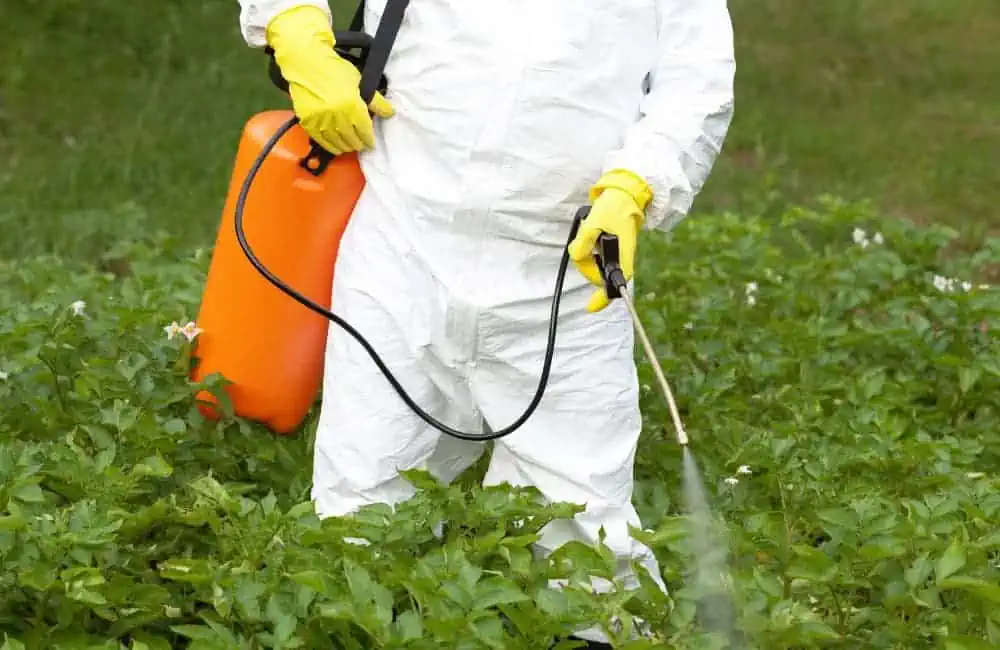What Is Paraquat Poisoning?
- Last Updated: July 27th, 2023

Attorney Jessica Paluch-Hoerman, founder of TruLaw, has over 28 years of experience as a personal injury and mass tort attorney, and previously worked as an international tax attorney at Deloitte. Jessie collaborates with attorneys nationwide — enabling her to share reliable, up-to-date legal information with our readers.
Legally Reviewed
This article has been written and reviewed for legal accuracy and clarity by the team of writers and legal experts at TruLaw and is as accurate as possible. This content should not be taken as legal advice from an attorney. If you would like to learn more about our owner and experienced injury lawyer, Jessie Paluch, you can do so here.
Fact-Checked
TruLaw does everything possible to make sure the information in this article is up to date and accurate. If you need specific legal advice about your case, contact us by using the chat on the bottom of this page. This article should not be taken as advice from an attorney.
What Is Paraquat Poisoning?
Paraquat is a commercial herbicide that has been used for decades on many different crops in the United States.
Although it was originally invented in the 19th century, products that contain paraquat became widely used in the U.S. beginning in the 1960s.
In 2016, based on numerous studies revealing the health hazards associated with paraquat use, the Environmental Protection Agency (EPA) opted to restrict the use of this dangerous chemical.

However, another controversial commercial herbicide, Roundup, which has also been long suspected of causing negative health consequences, remains totally legal.
As of 2022, you must be a commercially licensed applicator who is certified by the EPA to legally purchase paraquat.
Licensed applicators must go through special training on how to safely use the herbicide.
Table of Contents
How You Could Be Poisoned by Paraquat
According to the Centers for Disease Control (CDC), the most likely way to be poisoned by paraquat is by ingesting it.
Paraquat that is marketed in the United States, under many different brand names, today generally contains safety additives, which aim to prevent users from accidentally drinking or eating it.
For one, paraquat typically contains a blue dye to help applicators distinguish it from other liquids, including beverages.
Paraquat also typically contains an agent that causes a person to begin vomiting if they ingest the chemical, as well as a pungent odor that is meant to deter applicators from accidentally consuming it.
However, if paraquat does not contain these safeguards, a person could accidentally mistake it for a beverage and ingest it.
It’s against the law in the United States to transfer paraquat from its container into another container, such as a beverage cup.
Licensed applicators and agricultural workers can also be exposed to paraquat by inhaling the chemical or through skin contact with products that contain paraquat.
While licensed applicators are the individuals most likely to be exposed to paraquat, it can affect others as well.
People who live in agricultural areas or near commercial farmland could also potentially be exposed to paraquat through water contamination or spray drift.
Individuals who touch the protective gear and clothing of people who have been using or applying paraquat could also potentially be exposed to the chemical.
Similarly, anyone who visits an agricultural work area where paraquat is being used could be exposed.
Paraquat Poisoning Severity

The severity of paraquat poisoning depends on a variety of factors.
Arguably the most important factor is how much paraquat was consumed.
Other factors include the frequency and length of exposure to the herbicide, along with the victim’s overall health status when they were exposed to paraquat.
Paraquat has the potential to damage tissue in the mouth, stomach, and intestines after entering the body.
It can also circulate around the body and cause further damage to the kidneys, lungs, and liver.
Immediate Symptoms of Paraquat Poisoning
One of the first signs of poisoning by paraquat is swelling and pain in the mouth and throat.
This is usually followed by digestive system issues.
People who ingest paraquat may experience nausea, vomiting, and bloody stools, among other symptoms.
Digestive system issues can quickly lead to other problems, like dehydration and reduced blood pressure.
Over time, paraquat poisoning can lead to heart damage, lung scarring, kidney damage, and liver damage.
Paraquat can begin to affect these organs within a few days or weeks.
Ingesting a large amount of paraquat can quickly lead to symptoms such as confusion, heart injuries, increased heartbeat, breathing difficulties, seizures, acute kidney failure, and unconsciousness.
Long-Term Side Effects of Paraquat Exposure
Individuals who accidentally ingest paraquat but don’t die right away could still experience long-term health complications.
Some of the most common complications of paraquat poisoning include heart failure, kidney failure, scarring in the lungs, and difficulty swallowing due to esophageal strictures.
Unfortunately, most people who ingest a significant amount of paraquat do not recover.
How to Protect Yourself from Paraquat Poisoning
Most people who are exposed to paraquat ingest it.
If you ingest even a small amount of paraquat, you should stop consuming the liquid and pursue prompt medical treatment.
However, you can be exposed to paraquat in other ways.
If you believe that you were exposed through skin contact with the substance, you should wash and scrub your body as thoroughly as possible and visit an emergency room or urgent care clinic to be treated.
Depending on how you were exposed, your medical care providers might treat you using activated charcoal or another substance to stop your body from continuing to absorb the herbicide.
They could also use nasogastric suction to essentially decontaminate your body by removing recently ingested paraquat.
You might receive fluids through an IV and medication to help you breathe and regulate your blood pressure.
While there is no known cure for paraquat poisoning, there are a wide variety of potential treatments.
Due to the serious nature of paraquat poisoning, it is vital to seek immediate medical attention if you are exposed to this hazardous chemical.
Toxic pesticides cause severe health consequences for this who are exposed and poisoned by them, and they may be entitled to compensation for pain and suffering, medical expenses, and lost wages.
TruLaw and their attorneys are investigating paraquat lawsuits today.
Use our instant Case Evaluation tool to learn if you are eligible to file a lawsuit against the manufacturer of paraquat today.

Managing Attorney & Owner
With over 25 years of legal experience, Jessica Paluch-Hoerman is an Illinois lawyer, a CPA, and a mother of three. She spent the first decade of her career working as an international tax attorney at Deloitte.
In 2009, Jessie co-founded her own law firm with her husband – which has scaled to over 30 employees since its conception.
In 2016, Jessie founded TruLaw, which allows her to collaborate with attorneys and legal experts across the United States on a daily basis. This hypervaluable network of experts is what enables her to share the most reliable, accurate, and up-to-date legal information with our readers!
Here, at TruLaw, we’re committed to helping victims get the justice they deserve.
Alongside our partner law firms, we have successfully collected over $3 Billion in verdicts and settlements on behalf of injured individuals.
Would you like our help?
At TruLaw, we fiercely combat corporations that endanger individuals’ well-being. If you’ve suffered injuries and believe these well-funded entities should be held accountable, we’re here for you.
With TruLaw, you gain access to successful and seasoned lawyers who maximize your chances of success. Our lawyers invest in you—they do not receive a dime until your lawsuit reaches a successful resolution!
AFFF Lawsuit claims are being filed against manufacturers of aqueous film-forming foam (AFFF), commonly used in firefighting.
Claims allege that companies such as 3M, DuPont, and Tyco Fire Products failed to adequately warn users about the potential dangers of AFFF exposure — including increased risks of various cancers and diseases.
Depo Provera Lawsuit claims are being filed by individuals who allege they developed meningioma (a type of brain tumor) after receiving Depo-Provera birth control injections.
A 2024 study found that women using Depo-Provera for at least 1 year are five times more likely to develop meningioma brain tumors compared to those not using the drug.
Suboxone Tooth Decay Lawsuit claims are being filed against Indivior, the manufacturer of Suboxone, a medication used to treat opioid addiction.
Claims allege that Indivior failed to adequately warn users about the potential dangers of severe tooth decay and dental injuries associated with Suboxone’s sublingual film version.
Social Media Harm Lawsuits are being filed against social media companies for allegedly causing mental health issues in children and teens.
Claims allege that companies like Meta, Google, ByteDance, and Snap designed addictive platforms that led to anxiety, depression, and other mental health issues without adequately warning users or parents.
Transvaginal Mesh Lawsuits are being filed against manufacturers of transvaginal mesh products used to treat pelvic organ prolapse (POP) and stress urinary incontinence (SUI).
Claims allege that companies like Ethicon, C.R. Bard, and Boston Scientific failed to adequately warn about potential dangers — including erosion, pain, and infection.
Bair Hugger Warming Blanket Lawsuits involve claims against 3M — alleging their surgical warming blankets caused severe infections and complications (particularly in hip and knee replacement surgeries).
Plaintiffs claim 3M failed to warn about potential risks — despite knowing about increased risk of deep joint infections since 2011.
Baby Formula NEC Lawsuit claims are being filed against manufacturers of cow’s milk-based baby formula products.
Claims allege that companies like Abbott Laboratories (Similac) and Mead Johnson & Company (Enfamil) failed to warn about the increased risk of necrotizing enterocolitis (NEC) in premature infants.
Here, at TruLaw, we’re committed to helping victims get the justice they deserve.
Alongside our partner law firms, we have successfully collected over $3 Billion in verdicts and settlements on behalf of injured individuals.
Would you like our help?








